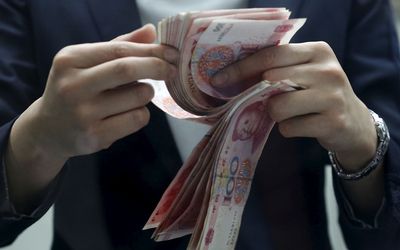Commodity exporters’ currencies advance after yuan strengthens
by Andrea Wong and Lucy Meakin,
2016-03-13 16:51:48.0
NEW YORK — The currencies of commodity exporters advanced as China’s central bank strengthened the yuan’s fixing by the most in four months, spurring demand for higher-yielding assets at the expense of those viewed as havens.
The Australian dollar paced gains versus its US counterpart, with the Canadian dollar, South African rand and Mexican peso also climbing.
Producers of raw materials tend to benefit from a strong Chinese economy. Japan’s currency dropped against all of its major peers and the euro fell as investors weighed the impact of stimulus that was extended on Thursday by the European Central Bank.
"What’s going on in China is very important, that’s definitely the key," said Charles St-Arnaud, a senior foreign-exchange strategist at Nomura Holdings in London. "How much higher can commodities currencies go from here depends whether we get a better global growth outlook."
The foreign-exchange rebound follows last year’s plunge on concern that China’s economic growth is slowing, damping the outlook for demand from the world’s second-largest economy. A recent stabilisation in the price of oil has helped the currencies of raw-materials exporters move higher as demand for havens ebbs.
The currencies of Australia, South Africa, New Zealand and Canada advanced at least 1% versus the dollar as of 5pm GMT in New York. The yen depreciated 0.6% to 113.86 per dollar.
The yuan reference rate became one of the most closely scrutinised indicators at the start of this year when a series of weaker fixings raised concern about the state of the nation’s economy. The onshore yuan advanced to the strongest level since December after China’s central bank raised its daily reference rate by 0.34%, the most in four months.
"The risk sentiment today is more stable as all the equity markets indices are trading higher," said Manuel Oliveri, a currency strategist at Credit Agricole SA’s corporate and investment-banking unit in London. "It is related to stabilising conditions in China, which is an important factor in the short term."
Bloomberg

Chinese yuan. Picture: REUTERS/KIM KYUNG-HOON
NEW YORK — The currencies of commodity exporters advanced as China’s central bank strengthened the yuan’s fixing by the most in four months, spurring demand for higher-yielding assets at the expense of those viewed as havens.
The Australian dollar paced gains versus its US counterpart, with the Canadian dollar, South African rand and Mexican peso also climbing.
Producers of raw materials tend to benefit from a strong Chinese economy. Japan’s currency dropped against all of its major peers and the euro fell as investors weighed the impact of stimulus that was extended on Thursday by the European Central Bank.
"What’s going on in China is very important, that’s definitely the key," said Charles St-Arnaud, a senior foreign-exchange strategist at Nomura Holdings in London. "How much higher can commodities currencies go from here depends whether we get a better global growth outlook."
The foreign-exchange rebound follows last year’s plunge on concern that China’s economic growth is slowing, damping the outlook for demand from the world’s second-largest economy. A recent stabilisation in the price of oil has helped the currencies of raw-materials exporters move higher as demand for havens ebbs.
The currencies of Australia, South Africa, New Zealand and Canada advanced at least 1% versus the dollar as of 5pm GMT in New York. The yen depreciated 0.6% to 113.86 per dollar.
The yuan reference rate became one of the most closely scrutinised indicators at the start of this year when a series of weaker fixings raised concern about the state of the nation’s economy. The onshore yuan advanced to the strongest level since December after China’s central bank raised its daily reference rate by 0.34%, the most in four months.
"The risk sentiment today is more stable as all the equity markets indices are trading higher," said Manuel Oliveri, a currency strategist at Credit Agricole SA’s corporate and investment-banking unit in London. "It is related to stabilising conditions in China, which is an important factor in the short term."
Bloomberg
























Change: 1.38%
Change: 1.54%
Change: 1.61%
Change: 1.25%
Change: 2.17%
Data supplied by Profile Data
Change: 0.43%
Change: 1.28%
Change: 1.38%
Change: 0.00%
Change: 1.64%
Data supplied by Profile Data
Change: 0.69%
Change: 0.44%
Change: 0.45%
Change: 0.90%
Change: 0.46%
Data supplied by Profile Data
Change: 0.47%
Change: 0.73%
Change: 1.10%
Change: -0.35%
Change: -0.64%
Data supplied by Profile Data